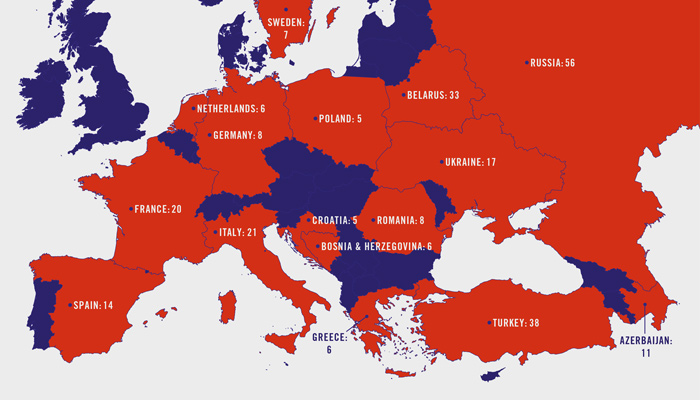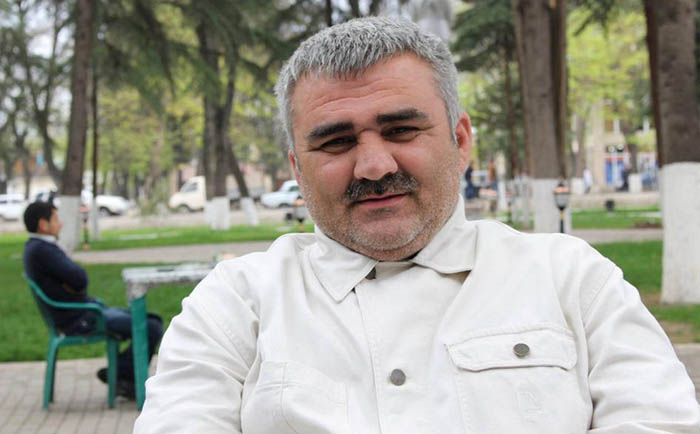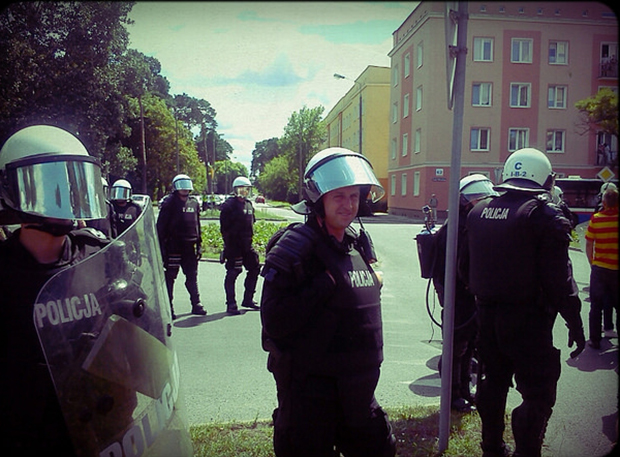Index relies entirely on the support of donors and readers to do its work.
Help us keep amplifying censored voices today.

Journalists continue to face unprecedented pressure in Europe as reports submitted to Index on Censorship’s Mapping Media Freedom platform in the first quarter of 2017 demonstrate. Media professionals—primarily in Turkey, Russia, Belarus and Ukraine—were arrested at an alarming rate, more than a fourfold increase over the fourth quarter of 2016.
“During the first quarter of 2017, the MMF database registered several trends that we find to be acute challenges to media freedom. Some European governments have clearly interfered with media pluralism. Others have harassed, detained and intimidated journalists. All of these actions debase and devalue the work of the press and undermine a basic foundation of democracy,” Hannah Machlin, project manager at Mapping Media Freedom, said.
During Q1, authorities in multiple countries shut down critical and independent media outlets and intimidated reporters who asked challenging questions. Turkey continues to be the largest jailer of journalists in the world with a total of 148 journalists in prison by the end of March according to the Platform for Independent Journalists P24, a Turkey-based MMF partner, which monitors the number of arrests in the country.
Even reporters in countries often thought to respect freedom of the press, such as Sweden, France and Germany, faced obstacles to performing their professional duties. They were abused by the leaders of extreme populist movements and their supporters, who encouraged a distrust of “mainstream media”; and blocked by nervous politicians who were seeing, particularly in France, the old political certainties swept away.
Between 1 January and 31 March 2017, Mapping Media Freedom’s network of correspondents and other journalists submitted a total of 299 violations of press freedom to the database.
The full report can be found online at Mapping Media Freedom or in PDF format.
[vc_row][vc_column][vc_column_text]

Afgan Mukhtarli. Credit: Meydan TV
Media outlets in Azerbaijan routinely deal with torture, assault, raids, imprisonment and endless intimidation, as verified reports submitted to Index on Censorship’s Mapping Media Freedom project show.
“The years-long crackdown on the independent press by the regime of Ilham Aliyev has accelerated in recent months. This is clearly one of the world’s worst environments for press freedom and, consequently, for the public’s right to information,” Hannah Machlin, project manager for Mapping Media Freedom, said.
International media freedom rankings confirm the country’s stagnating record where autocratic repression is consistent, if not the functioning political system itself. Although authorities continue to claim that the majority of the country’s 147 political prisoners are criminals, religious radicals and tax evaders, the international community of rights watchdogs view it differently. A new wave of attacks against media freedom advocates, journalists and activists within the past two months alone illustrate a place where the primacy of Ilham Aliyev, Azerbaijan’s president, and his word overrides the primacy of the words of others, particularly his critics.
One such critic, Afgan Mukhtarli, an investigative journalist, disappeared on 29 May while on his way to his home in Tbilisi. Mukhtarli reappeared the next day across the border in Azerbaijan and was accused of illegal border crossing, smuggling (police allegedly found €12,000 on him) and resisting police. He was immediately sentenced to three months in pre-trial detention.
Speaking to Mapping Media Freedom, Mukhtarli’s wife Leyla Mustafayeva said she was relieved when she heard news of his arrest because after reporting her husband missing the day before, she had assumed he was dead. However, that is the only relief Mustafayeva has had since her husband’s kidnapping:
“I have no hope for the investigations. They have been stalled. They don’t want to investigate. Police allegedly cannot find any footage. The only video that was made available to our lawyer was shown two weeks after Mukhtarli’s disappearance and it’s just of my husband getting on the bus that usually takes him home.”
Mukhtarli’s case is unique in that his is the first cross-border operation alleged to be carried out in tandem with the Georgian government. While this has yet to be confirmed by officials in Georgia, Azerbaijani lawmaker and a member of the Parliament Human Rights Committee Elman Nasirov claimed Mukhtarli’s kidnapping was “the most successful operation carried out in recent years.” Nasirov also accused Mukhtarli of being a member of a far larger anti-Azerbaijan network.
[/vc_column_text][/vc_column][/vc_row][vc_row][vc_column][vc_separator color=”black” align=”align_left”][vc_row_inner][vc_column_inner width=”1/2″][vc_custom_heading text=”Mapping Media Freedom: Azerbaijan” font_container=”tag:p|font_size:24|text_align:left” use_theme_fonts=”yes” link=”url:https%3A%2F%2Fmappingmediafreedom.org%2Fplus%2F%3Fs%3DAzerbaijan|||”][vc_column_text]Index on Censorship monitors press freedom in Azerbaijan and 41 other European area countries.
As of 14/07/2017, there were 60 verified reports of violations connected to Azerbaijan in the Mapping Media Freedom database.[/vc_column_text][/vc_column_inner][vc_column_inner width=”1/2″][vc_single_image image=”94222″ img_size=”full” alignment=”center” onclick=”custom_link” link=”https://mappingmediafreedom.org/#/”][/vc_column_inner][/vc_row_inner][vc_separator color=”black” align=”align_left”][/vc_column][/vc_row][vc_row][vc_column][vc_column_text]“Muktharli was assigned to carry out subversive activities in Azerbaijan,” Nasirov asserted, claiming that as a preventive mechanism, Azerbaijani special forces made necessary arrangements with Georgian special forces. “The are principles and rules for this. Based on security principles, this how it was made possible to bring Mukhtarli to Azerbaijan,” said Nasirov in an interview with Azadlig Radio, the Azerbaijani service for Radio Free Europe Radio Liberty.
Police have questioned political activists, members of opposition parties, and journalists as part of the investigation. Sevinc Vagifqizi, a freelance reporter, was detained while waiting for news outside the state border services where Mukhtarli was being held. Speaking to journalists after her brief detention, Vagifqizi said that police allegedly thought she was going to disturb peace outside the building. Other journalists who have been questioned in the case of Mukhtarli are investigative journalist Khadija Ismayilova, who is facing a travel ban despite her release from jail, and, more recently, Aytac Ahmadova.
The circumstances of Mukhtalri’s arrest were notably suspicious. Outside of his abduction, Mukhtarli’s lawyer was also quick to report on the injuries Mukhtarli suffered, including a broken nose, multiple bruises and possibly a broken rib. Mukhtarli is not the only journalist who appears to have been subjected to alleged police brutality. Nijat Amiraslanov, a member of the NIDA civic movement and an independent journalist based in Gazakh, reportedly lost his front teeth while serving his 30-day administrative detention. In his statement, however, Amiraslanov said his teeth fell out on their own, and that there was no ill-treatment during his detention. After Amiraslanov’s teeth fell out, the journalist refused an appeal filed by his lawyer. Amiraslanov was released on 21 June after completing the detention period.
In another show of force, police raided the office of independent online television channel Kanal 13 on 3 June, confiscating computers and other documents. Police had already detained the channel’s manager Aziz Orucov (Garashoglu) earlier in May. Orucov was sentenced to 30 days of administrative detention on the grounds of allegedly resisting police. Additional charges of illegal entrepreneurship and abuse of power were brought against Orucov on the day of his release. He was sentenced to four months in pre-trial detention.
While these men await trial, another journalist and editor-in-chief of the news website Journalistic Research Center (jam.az) Fikrat Faramazoglu was sentenced to seven years in jail on 14 June. Faramazoglu was found guilty on charges of extortion. In his defence statement, the journalist said it was his reporting on a chain of brothels that were protected by the law-enforcement agencies that incited his arrest. Faramazoglu was also banned from working as a journalist for two years following the completion of his prison term.
A classic case of revolving door policy
Rather than continue to release its political prisoners, the Azerbaijani government continues to arrest more reporters and further tightens controls on the media sector.
“There are some ten journalists and bloggers currently in prison [in Azerbaijan]. Based on these new arrests, Azerbaijan is trying to return to the list of countries where journalists critical of the government end up in jail on bogus charges,” said Muzaffar Suleymanov from the Civil Rights Defenders, a Stockholm-based rights watchdog in an interview with Mapping Media Freedom. Furthermore, a recent decision by a Baku court to block access to independent and opposition news websites broadcasting from abroad is a matter of more concern, added Suleymanov.
Levan Asatiani from Amnesty International echoed these sentiments adding that, as an international community of watchdogs, they have not seen any improvements, only a further deterioration in the human rights situation in Azerbaijan.
“While there have been releases, there have been new arrests or travel bans introduced against former prisoners of conscience,” Asatiani said. There are also legal boundaries in place that prevent the work of remaining independent civil society organisations in Azerbaijan.
It is no longer enough to make statements and express concern says Suleymanov. The Council of Europe should hold its members responsible for violating human rights while the EU must set benchmarks in accordance with the human rights situation as it negotiates a new agreement with Azerbaijan, noted Asatiani.[/vc_column_text][/vc_column][/vc_row][vc_row][vc_column][vc_basic_grid post_type=”post” max_items=”12″ style=”load-more” items_per_page=”4″ element_width=”6″ grid_id=”vc_gid:1500022088088-43842239-2fe8-0″ taxonomies=”7145″][/vc_column][/vc_row]
Mr Isaias Afewerki
President of Eritrea
Office of the President
PO Box 257
Asmara, Eritrea
Dear President Afewerki,
We, the Youth Advisory Board of Index on Censorship — a global free expression organisation — are writing to you to call for the immediate release of imprisoned journalists in Eritrea.
We condemn the brutality and ruthlessness with which your regime has gagged expression and assaulted the rights of its citizens to access information.
The very constitution on which your regime governs upholds the rights of all to freedom of conscience. Yet journalists are imprisoned and go missing at the hands of your government. Eritrea has been ranked last on the Reporters Without Borders World Press Freedom Index for the past eight years. At least 15 journalists are currently detained and, out of 13 journalists incarcerated in 2001, only four remain alive today.
Dawit Isaak, a Swedish-Eritrean journalist, was arrested in 2001 and has since been held incommunicado and in solitary confinement without any charges or a verdict. He has not seen a lawyer or his family for 13 years. Eritrean authorities have ignored the appeals of the European Union, the African Commission on Human and Peoples’ Rights and a lawsuit before a Swedish court.
Seyoum Tsehaye, imprisoned for writing an article that criticised your regime, also has not seen anyone from the outside world since 2001 — including his daughter, who was born soon after his arrest.
Seyoum is a journalist, photographer and prisoner of conscience who earned fame for capturing moving images of Eritrea’s war of independence. That war ended in Eritrea’s first multi-party elections in which your party was victorious, but the people of Eritrea have not seen elections or democracy in any meaningful form since. For speaking out and fighting for freedom to be restored to his country, Seyoum has paid a heavy price.
Eritreans have been denied their human right to freedom of expression. International agencies and human rights groups have alerted the world to arbitrary imprisonment and torture within Eritrea. The government’s attempts to silence critical voices and media workers must end. We urge you to release all journalists from prison and respect international human rights law by granting all Eritreans their right to freedom of expression.
Signed,
The Index on Censorship Youth Advisory Board
This letter was written by the Index on Censorship Youth Advisory Board, a group of 16-25 year olds drawn from the global community and who were moved to write this letter following a meeting with 2016 Index on Censorship Freedom of Expression Awards finalist Vanessa Berhe.
At just 16 years old Berhe set up the organisation One Day Seyoum to campaign for the release of her uncle Seyoum Tsehaye, a journalist who has been imprisoned in Eritrea since 2001. Show your support for the campaign here.

Polish police. Credit: Flickr / Kamil Gopaniuk
A recent audit by the bureau of internal affairs (BSW) has uncovered two informal press surveillance units of the Polish police that were set up to monitor journalists in connection with the “tape scandal” for one year between 2014-15.
The “tape scandal” refers to a series of secretly recorded conversations between leading political figures that occurred at a well-known restaurant in Warsaw.
As the daily Rzeczpospolita reveals, the surveillance units, made up of 29 policemen, were quickly formed following the publication of recordings of conversations in 2014. One of the units oversaw the tapping and infiltrating the journalists and their contacts while the second looked into whether secret services (ABW and CBA agencies) were at the root of the affair.
According to the weekly Newsweek Polska, around 80 individuals were allegedly under surveillance, including the families and lawyers of journalists reporting on the affair.
While the list of individuals watched by the police remains unpublished, it appears that Piotr Nisztor, who brought the taped conversations to light, as well as the wife of Sylwester Latkowski, the then-editor-in-chief of the weekly Wprost, are among them.
As various Polish sources reported, in order to by-pass the law, the surveillance was of “unknown persons” and within the parameters of other investigations. Evidence of the surveillance has apparently been destroyed, so all that remains as the basis of an investigation into the surveillance are notes.
The internal audit by the BSW was ordered by Zbigniew Maj, the new head of the department.
The Association of Polish Journalists (SDP) issued an appeal to the minister of internal affairs, Mariusz Błaszczak, for a continued investigation and preventive measures for the future.
While the surveillance in question undoubtedly took place during the PO Civic Platform party term of office (a party now in opposition), increased police power is something the new government seemingly welcomes: on 15 January, the PiS Law and Justice Party-dominated parliament approved legal changes that include the widening police powers for surveillance.
Mapping Media Freedom
|